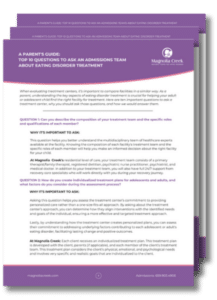- Do the programs offer the level of care needed?
- Does the facility offer a treatment environment that works for you?
- How far are you willing to travel for treatment?
- Residential Treatment
- Partial Hospitalization Program
- Intensive Outpatient Program
- Initial phone call
- Insurance verification
- Clinical assessment
- Admission date scheduling
- In-person assessment
- Final intake paperwork
- Treatment begins
What our clients are saying

Who We Are
As one of the top residential eating disorder treatment centers in the US, Magnolia Creek can help you or your loved one find the path to a better life. Looking for Treatment?
Resource Guide
Navigating You Through the Eating Disorder Treatment Process
Finding the right facility for treatment can be an overwhelming process. In this guide, you’ll be equipped with resources that can help make the journey of finding treatment easier for you or your loved one.
Our free resource guide will help you:
- Recognize the key signs and symptoms to look out for if you suspect that you or a loved one has an eating disorder.
- Determine the key topics to discuss with the admissions team to choose the right facility for you or your loved one.
- Better understand what treatment will look like at Aster Springs.
- Feel confidently prepared to take the next step towards finding eating disorder treatment.

Download Our Toolkit
HubSpot Download Button Code Here
What our clients are saying

Who We Are
Our all-women’s campus provides a safe place to heal with a treatment team that leads our program in a serene, 36-acre campus overlooking a pond where women can connect to nature, themselves, and one another, unburdened. Located just outside of Birmingham, Alabama, our eating disorder treatment center provides care to adolescent girls (ages 12 to 17) and adult women (ages 18 and older) who struggle with feeding or eating disorders including anorexia nervosa, binge eating disorder, bulimia nervosa, compulsive exercise disorder, diabulimia, other specified feeding or eating disorder (OSFED), purging disorder, and unspecified feeding or eating disorder (UFED).
Dually licensed as an eating disorder center as well as a mental health treatment center, Magnolia Creek can tailor a dual diagnosis program for co-occurring mental health conditions including mood disorders, obsessive-compulsive disorder (OCD), post-traumatic stress disorder (PTSD), attachment disorder, dissociative disorders, and personality disorders.

